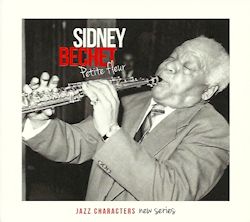CD1
1. Sweetie Dear
2. I’ve Found a New Baby
3. Maple Leaf Rag
4. Shag
5. Dear Old Southland
6. Blackstick
7. When the Sun Sets Down South
8. What a Dream
9. Chant in the Night
10. Really the Blues
11. When You and I Were Young, Maggie
12. High Society
13. Indian Summer
14. One O’clock Jump
15. Four or Five Times
16. Lazy River
17. China Boy
18. If I Could Be with You
19. That’s a Plenty
20. Old Man Blues
21. Wild Man Blues
22. Blues in Thirds
23. Stompy Jones
24. Muskrat Ramble
CD2
1. Egyptian Fantasy
2. Baby, Won’t You Please Come Home
3. Slippin’ and Slidin’
4 The Sheik of Araby
5. Swing Parade
6. When It’s Sleepy Time Down South
7. I Ain’t Gonna Give Nobody None of This Jelly Roll
8. I’m Coming Virginia
9. Georgia Cabin
10. Strange Fruit
11. Twelfth Street Rag
12. What is This Thing Called Love?
13. V-disc Blues
14. Blue Horizon
15. Weary Blues
16. Out of the Gallion
17. Blame It on the Blues
18. Old Stack O’Lee Blues
19. Spreadin’ Joy
20. Polka Dot Stomp
21. Buddy Bolden Stomp
22. My Woman’s Blues
23. Just One of Those Things
24. Love for Sale
25. Shake ‘em Up
CD3
1. Sister Kate
2. Tiger Rag
3. When the Saints Go Marching In
4. September Song
5. Careless Love
6. Tailgate Ramble
7. Joshua Fit de battle o’ Jericho
8. Honeysuckle Rose
9. Les Oignons
10. Mon Homme
11. Wrap Your Troubles in Dreams
12. Please Don’t Talk about Me When I’m Gone
13. After You’ve Gone
14. Going Way Down Home
15. Lastic
16. Promenade des Champs-Elysées
17. En Attendant le Jour
18. Si Tu Vois Ma Mère
19. Dans les Rues d’Antibes
20. Petite Fleur
21. My Melancholy Baby
22. Black Bottom Stomp
23. The Man I Love
24. Exactly Like You
25. All of Me
26. It Don’t Mean a Thing
“Sidney Bechet was one of the truly great originals”. Thus spake Duke Ellington, for whom Bechet played for a while in 1924. This triple album
substantiates Ellington’s belief in Bechet’s originality. Sidney had a unique sound on the soprano saxophone, as well as being one of the first jazz
musicians really to swing. Every track here illustrates Bechet’s brilliant technique – on clarinet as well as soprano saxophone. His fluency while
improvising was sometimes startling. Just listen to the ease with which he conquers Alphonse Picou’s tongue-twisting solo on High Society. His
playing could be very free: stepping across bar-lines and altering notes using his wide vibrato or changes in pitch. And he had a unique tone which has not
been matched by most subsequent exponents of the soprano sax.
All these qualities are evident in a track like I’ve Found a New Baby, one of four tracks recorded by the New Orleans Feetwarmers in 1932, the
year when this compilation starts. The album omits earlier recordings like those he made with Clarence Williams in the early 1920s. And I can’t find any of
the records that Bechet made with Louis Armstrong. At any rate, Sidney is well supported on these 1932 cuts and on many later tracks by Tommy Ladnier, who
proves himself an ideal lead trumpeter. Dear Old Southland begins with Bechet playing a poetic cadenza, while When the Sun Sets Down South shows his poignant side.
This collection includes many recordings made by orchestras led by Bechet, and also numbers where he plays with the bands of other people, such as Noble
Sissle, Jelly Roll Morton and Claude Luter. Exciting as many of the bigger-band numbers can be – mostly at fast tempos – I find myself drawn to the
recordings made by Bechet with smaller groups. Outstanding among these is The Sheik of Araby, where Sidney accompanied himself using no fewer than
six instruments – an early example of multi-tracking. He delivers Strange Fruit movingly, leading a trio completed by pianist Willie “The Lion”
Smith and guitarist Everett Barksdale. Another memorable trio recording was Blues in Thirds, with Earl Hines and Baby Dodds. And it is good to
hear him in a sextet (tracks 8, 9, 11 and 12 on the second CD) with Charlie Shavers, one of the most underrated musicians in jazz. He is especially
rhapsodic in What is This Thing Called Love?
The last CD is dominated by recordings in France, where Bechet spent the last years of his life. It was a fruitful period, including two compositions by
Sidney which widened his appeal. Petite Fleur became a hit – if not for Bechet then for Chris Barber’s Jazz Band. And Les Oignons (“The
Onions”) was taken up by innumerable trad bands.
Sidney was never backward in coming forward, and I suspect he chose to play the soprano sax because it could soar over the other instruments. But this
assisted his lyricism and the rich legato lines he created, letting the music flow. He may have been a difficult man to work with but he was a
ground-breaking musician who set a very high standard.
Tony Augarde
www.augardebooks.co.uk
